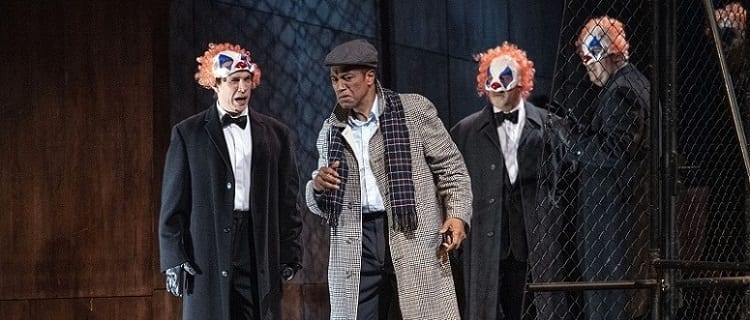I am delighted to report that on this tour three out of the three operas brought to us by the Welsh National Opera were extremely worth attending both musically and dramatically. The revival of Verdi’s Rigoletto updated in concept for the WNO by James Macdonald seems even more relevant than ever. Indeed, it must be impossible to see this version of Rigoletto without thinking about Jeffrey Epstein and his circle and their culture and crimes. The curtain goes up on a posh elegant party of the kind that Epstein and his peers have been giving for years, a party at which the Duke is clearly the host and main player. As the curtain rises, he is having sex on a couch with an all-too-willing woman while through the glass doors you see the guests dancing and flirting and drinking. The sequence suggests we are in a world of corrupt politicians, rabidly self-indulgent businessmen and even gangsters, a world of loose morals and easily available drugs, drink and sex. The connection of the original story set in the fifteenth century to the mind-set and behaviour of the contemporary privileged, to today’s powerful and entitled is startlingly clear and inescapable. The tale of Rigoletto is a contemporary story.
The characterizations in this update work brilliantly. Rigoletto is the self-loathing “court jester” selling his soul for his income and giving his boss what he wants, massaging the Duke’s ego as necessary and acting out the need to humiliate and abuse. Gilda, his daughter, is the innocent and honest believer in love who is also too naïve to be able to accept the Duke’s betrayal and stop loving him once she sees the reality of this world; she is the self-sacrificing “angel”. And the Duke believably has his moment of being captivated by Gilda, even suggesting that he truly believes briefly that honest and faithful love is possible. But he is too corrupted and accustomed to a very different world and reverts easily to his worst self, using his charm and wealth to satisfy his wants. The portrayal of the macho, self-involved chorus of “courtiers” is beautifully sinister and, at times, full of suitably black humour. Robert Innes Hopkins’s set and costume designs help involve us into this concept; including a fine set for the Duke’s “oval office” in the second act that got a laugh from the audience when the curtain went up. It is hard not to think of certain politicians in the United States who promote the most retrograde and abusive ideas about how to treat women and how to get whatever they want.
David Junghoon Kim was very appealing and believable as the Duke, making him almost a sympathetic lost soul. He has the voice and strong stage presence and at moments in his big numbers produced some beautiful and varied sound with a real sense of the nuances of the music. He does, however, like to push a bit at a stentorian presentation. He doesn’t need to! The voice is quite sumptuous and I would like to hear it handled with a bit more restraint. Mark S Doss went from strength to strength as Rigoletto, touching in his scenes with Gilda, frightening in his question for vendetta, despicable in his baiting of the courtiers, tortured by his guilt and complicity in the Epstein-style life of his boss. He has a burnished sound and I would love to see him in other roles. All the roles were well-performed both dramatically and musically, and I want to note the fine performances by Emma Carrington as Maddalena and Wojtek Gieriach as Sparafucile, the latter able to be both scary and funny. Eddie Wade as Monterone certainly knows how to curse convincingly and all the courtiers had a real sense of the drama of their roles.
But for me the standout singing and acting of the evening came from Haegee Lee (o 18 Hyd) as Gilda. Her voice is on the light side but she handled it with beauty and control, singing with constraint and real taste; she was also completely immersed in the acting. She embodied her character in every way. She was an extremely convincing Gilda not least because she seemed to stop people from breathing with her Caro Nome, so rapt was everyone in her performance. Her duet with Rigoletto in the second scene was immensely touching; and her love duet with the Duke made her later sacrifice of herself for him utterly convincing. It was a very fine, all round evening. The singing of La Donna e mobile and of the Quartet were everything you could hope for. Add to that an idiomatically sound approach to the entire score by conductor Alexander Joel, and this Rigoletto added up to an immensely satisfying experience that was worthy of one of Verdi’s masterpieces.

